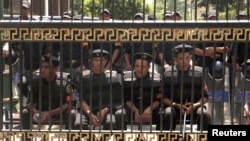CAIRO — Egypt's new president briefly reconvened parliament Tuesday in defiance of the military, which dissolved the legislature last month based on a high court order. Afterwards, Egypt's highest court has overruled Mohamed Morsi's decision to recall the Islamist-led parliament that was dissolved by the nation's military leaders last month.
A judicial source said the ruling came hours after Egypt's Islamist-led lower house of parliament reconvened briefly Tuesday in defiance of orders by the country's military and Supreme Court.
About 200 people gathered outside Egypt's parliament on Tuesday as some lawmakers briefly returned to the lower house after President Mohamed Morsi called on them to do so.
Ahmed Mahmoud Atalla, a legislator from the liberal Wafd party, attended the session.
He says the meeting focused on finding a way to implement the court's ruling, adding that the speaker of parliament briefed everyone on events and then referred the case to the Court of Cassation (Appellate Court) to decide on the eligibility of each member.
In its ruling that led to the military's dissolution of parliament, the Constitutional Court said the Muslim Brotherhood had filled some of the seats allocated for independent candidates, marring the election process.
Many pro-Morsi demonstrators said they support the president's decision to recall parliament, saying he is a reformer and the military is trying to stand in his way.
Housewife Um Mohamed says she came because parliament's work is the interest of the people and they want the country to be good. She adds that Egypt was ruined under the corruption of the previous government and the people want to see that change.
Some analysts have predicted that the president's decision would put him on a path of confrontation with the country's powerful military rulers. But Saber Saad El Din, a football coach, disagrees.
He says he thinks President Morsi is too smart to get into a confrontation with the army. He adds that for 60 years, Egypt was controlled by military-backed rulers and now for the first time there is a civilian leader.
But opponents of the president's decision include some who voted for him.
Youssef Abdel Hafiz who works in the private sector says he voted for Morsi but has now shifted 180 degrees because the president "violated a ruling of the constitutional court." He also expressed suspicion about Morsi's background as a member of the Muslim Brotherhood, which many see as a secretive organization.
He says President Morsi announced that he broke with the Muslim Brotherhood but he did not, and now takes his decisions from the Brotherhood's highest ranks. He says the people just want him to make his decisions as an individual and the nation will support him, but if the Brotherhood gives him an agenda to execute they will reject that.
In what some here see as a sign that relations between the president and the military's top ranks have not completely broken down, Morsi and the head of the military council appeared together Monday at a military graduation ceremony.
A judicial source said the ruling came hours after Egypt's Islamist-led lower house of parliament reconvened briefly Tuesday in defiance of orders by the country's military and Supreme Court.
About 200 people gathered outside Egypt's parliament on Tuesday as some lawmakers briefly returned to the lower house after President Mohamed Morsi called on them to do so.
Ahmed Mahmoud Atalla, a legislator from the liberal Wafd party, attended the session.
He says the meeting focused on finding a way to implement the court's ruling, adding that the speaker of parliament briefed everyone on events and then referred the case to the Court of Cassation (Appellate Court) to decide on the eligibility of each member.
In its ruling that led to the military's dissolution of parliament, the Constitutional Court said the Muslim Brotherhood had filled some of the seats allocated for independent candidates, marring the election process.
Many pro-Morsi demonstrators said they support the president's decision to recall parliament, saying he is a reformer and the military is trying to stand in his way.
Housewife Um Mohamed says she came because parliament's work is the interest of the people and they want the country to be good. She adds that Egypt was ruined under the corruption of the previous government and the people want to see that change.
Some analysts have predicted that the president's decision would put him on a path of confrontation with the country's powerful military rulers. But Saber Saad El Din, a football coach, disagrees.
He says he thinks President Morsi is too smart to get into a confrontation with the army. He adds that for 60 years, Egypt was controlled by military-backed rulers and now for the first time there is a civilian leader.
But opponents of the president's decision include some who voted for him.
Youssef Abdel Hafiz who works in the private sector says he voted for Morsi but has now shifted 180 degrees because the president "violated a ruling of the constitutional court." He also expressed suspicion about Morsi's background as a member of the Muslim Brotherhood, which many see as a secretive organization.
He says President Morsi announced that he broke with the Muslim Brotherhood but he did not, and now takes his decisions from the Brotherhood's highest ranks. He says the people just want him to make his decisions as an individual and the nation will support him, but if the Brotherhood gives him an agenda to execute they will reject that.
In what some here see as a sign that relations between the president and the military's top ranks have not completely broken down, Morsi and the head of the military council appeared together Monday at a military graduation ceremony.
